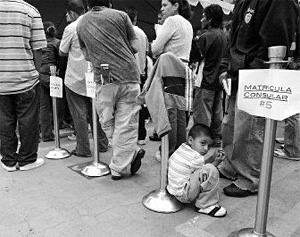 |
 |
 |
 Health & Beauty | June 2007 Health & Beauty | June 2007  
Mexican Consulates Take on U.S. Healthcare System
 Ricardo Alonso-Zaldivar & Anna Gorman - LATimes Ricardo Alonso-Zaldivar & Anna Gorman - LATimes


| | A boy waits while his parents apply for photo identification cards at the Mexican Consulate in Los Angeles, which also offers healthcare information and basic preventive testing. (Los Angeles Times/Mark Boster) |
First came the Mexican consular photo identification cards that closely resembled U.S. driver's licenses and allowed immigrants, including those in the United States illegally, to establish credit and apply for government services.

Then the Mexican government worked with the U.S. Treasury Department to make sure the U.S. banking system remained open to immigrants.

Now Mexican consulates in the U.S. are taking on an even more formidable challenge: the healthcare system.

A program called Ventanillas de Salud, or Health Windows, aims to provide Mexican immigrants with basic information, cholesterol checks and other preventive tests.

It also makes referrals to U.S. hospitals, health centers and government programs where patients can get care without fear of being turned over to immigration authorities.

"Being undocumented, we thought we didn't have the right to certain things," said Rosalba Hernandez, 26, who came to the United States two years ago and lives in Los Angeles. "We were scared to ask for information."

Hernandez, a housecleaner, and her boyfriend, a gardener, said they rarely go to the doctor because they are afraid of the cost and of being deported.

But after a recent visit to the Mexican Consulate to get her consular ID card, Hernandez now knows that she can get affordable insurance and free access to some government health services.

Ventanillas began in 2003 as an experimental collaboration between the Mexican government and the Health Initiative of the Americas, a University of California program. The first two, in Los Angeles and San Diego, were funded with a grant from the California Endowment. The program now operates in 11 cities, including Houston and Chicago, and the goal is to have a version in all 47 Mexican consulates around the United States.

"In the L.A. Consulate, we noticed there were 1,000 or 2,000 people visiting on a daily basis, waiting for their appointments," said Xochitl Castaneda, director of the Health Initiative. "They were hanging around, eating junk food, watching TV. And we thought: This is an opportunity. We can provide them with information about health and with referrals."

"Health-related issues are a very important absent piece of information," said Ruben Beltran, Mexican consul general in Los Angeles.

"We're filling the blanks. ... The consulate is the prime location to disseminate that information to the Mexican community."

Some recent research indicates that many illegal immigrants don't regularly use the public healthcare system.

A Rand Corp. study published last year found that adult immigrants in general, and the undocumented in particular, consume fewer healthcare resources per person than the native-born. In part that's because immigrants are younger and healthier and because they are less likely to have health insurance, the study found.

Illegal immigrants are not eligible to enroll in major government health insurance programs such as Medicare and Medicaid. | 
 | |
 |



